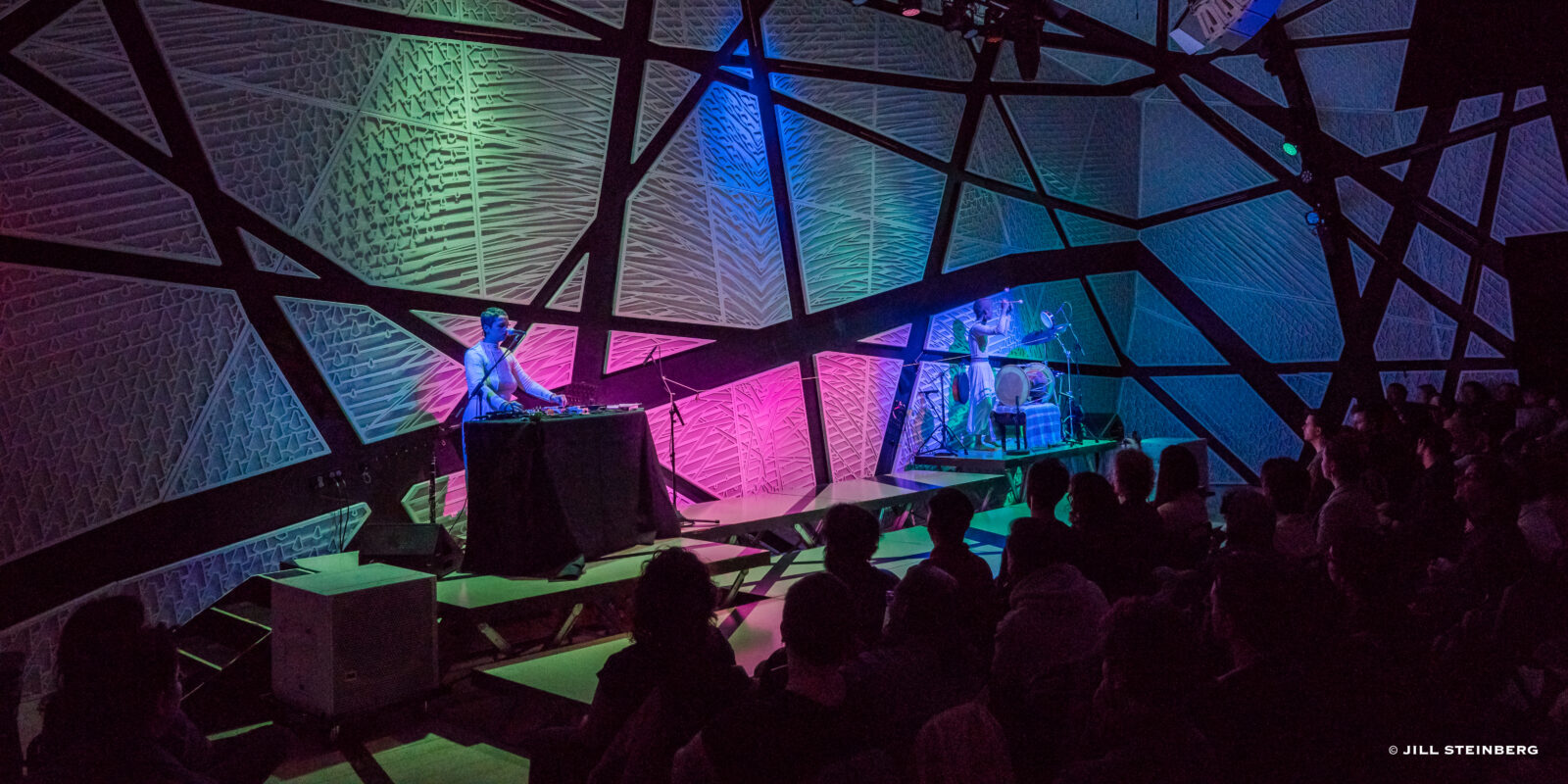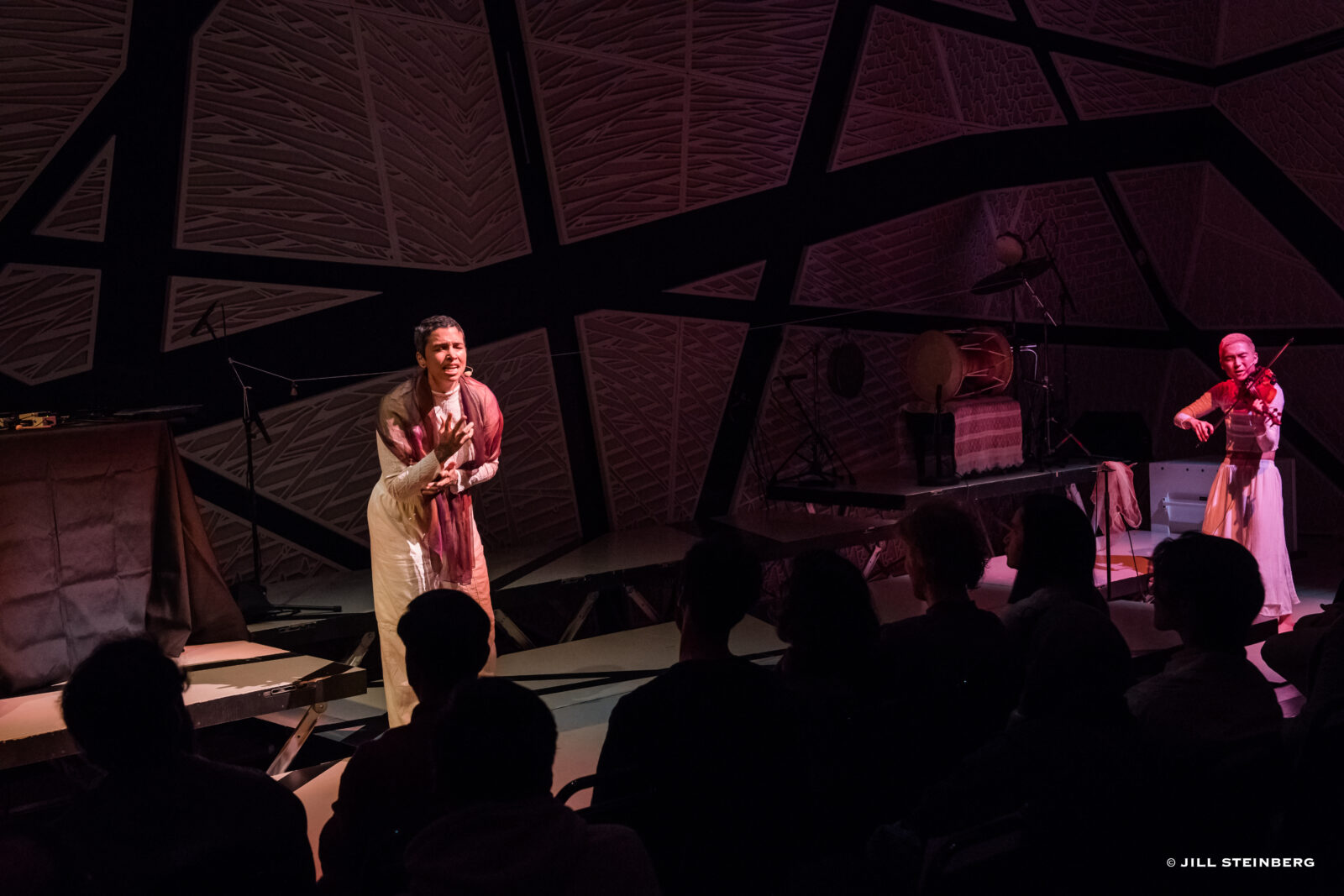
How does it feel to look at nothing
How does it feel to look at nothing
Holland Andrews + yuniya edi kwon, Holland Andrews, yuniya edi kwon
Holland Andrews + yuniya edi kwon, Holland Andrews, yuniya edi kwon
An opera of the elemental, of pre-deities, and illusions of containment, How does it feel to look at nothing is an embodied, interdisciplinary performance emerging through a story of transitional states. Composer-performers, multi-instrumentalists, and vocalists Holland Andrews and yuniya edi kwon co-create this work of composition, improvisation, dance, physical theater, and ritual. Using a new language of disintegration, How does it feel to look at nothing is an embodied pre-origin story of a Deity of Namelessness. Inspired by Andrews’ and kwon’s shared spiritual experiences, the opera explores the forces and conditions that shape a deity’s formation, and the generational consequences of choosing to remain nameless.
While developing the work, Andrews and kwon (who are married) are simultaneously engaging with questions of queer parenthood, trans pregnancy, and contemporary life as trans artists of color. Over the course of the opera’s creation, Andrews and kwon will find themselves also navigating the real-life, emotionally rich, and spiritually complex socio-political terrain of queer-trans family building during a period of American imperial disintegration. By the time this opera premieres in 2026, they expect to be new parents, navigating a world that is, unfortunately, increasingly hostile to trans life, trans fecundity, and trans families. Through the very personal and public-facing work of How does it feel to look at nothing, they hope to reflect the shifting, disintegrative reality of trans life, while also offering an expansive, transformational vision of trans futures. They do this by destabilizing the European operatic & libretto traditions, connecting to their anti-colonial creative & spiritual lineages, and blurring it all within a looping hyperreality of life, mythology, and performance.
Multimedia Performance, Music, Opera, Performing Arts
2025
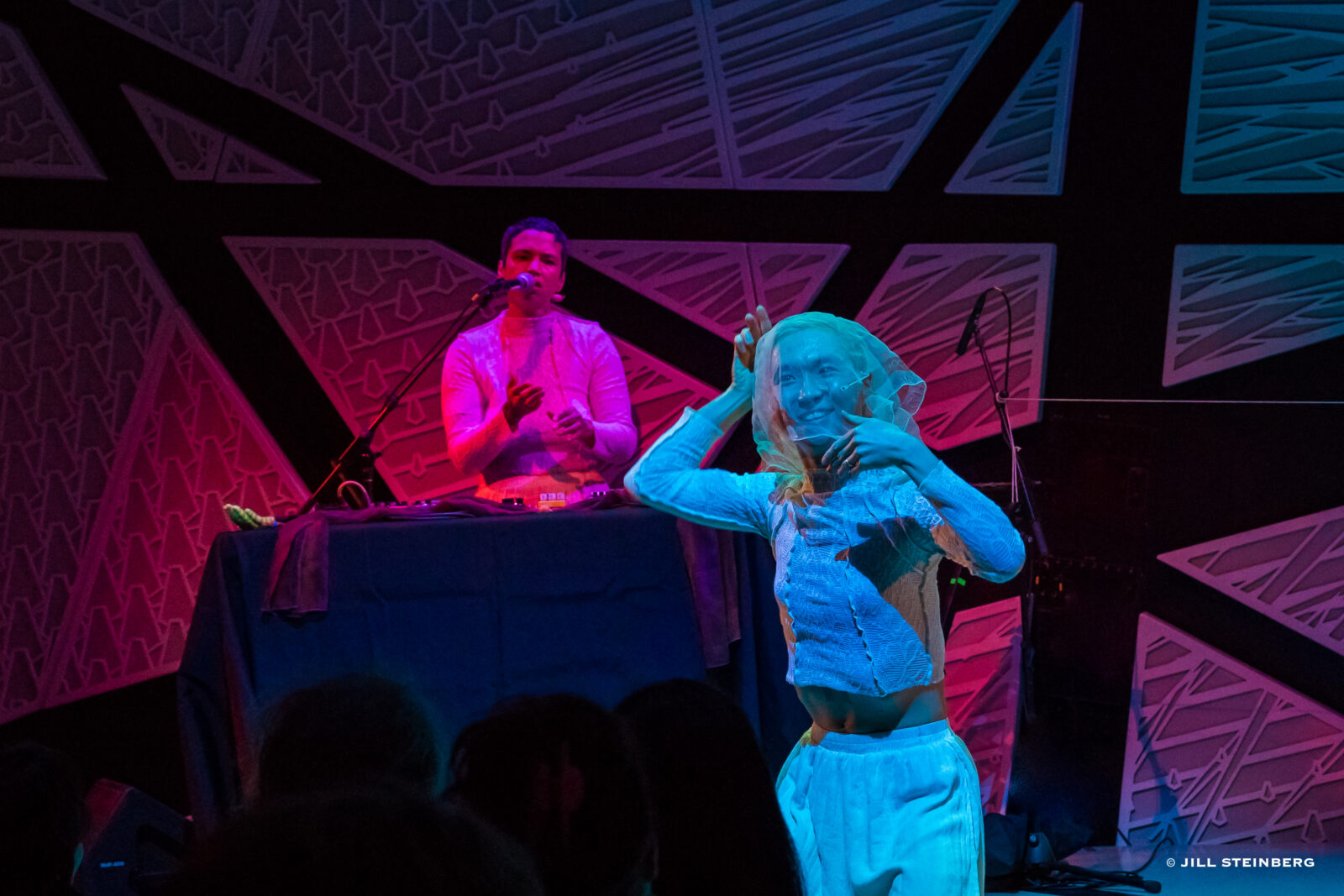
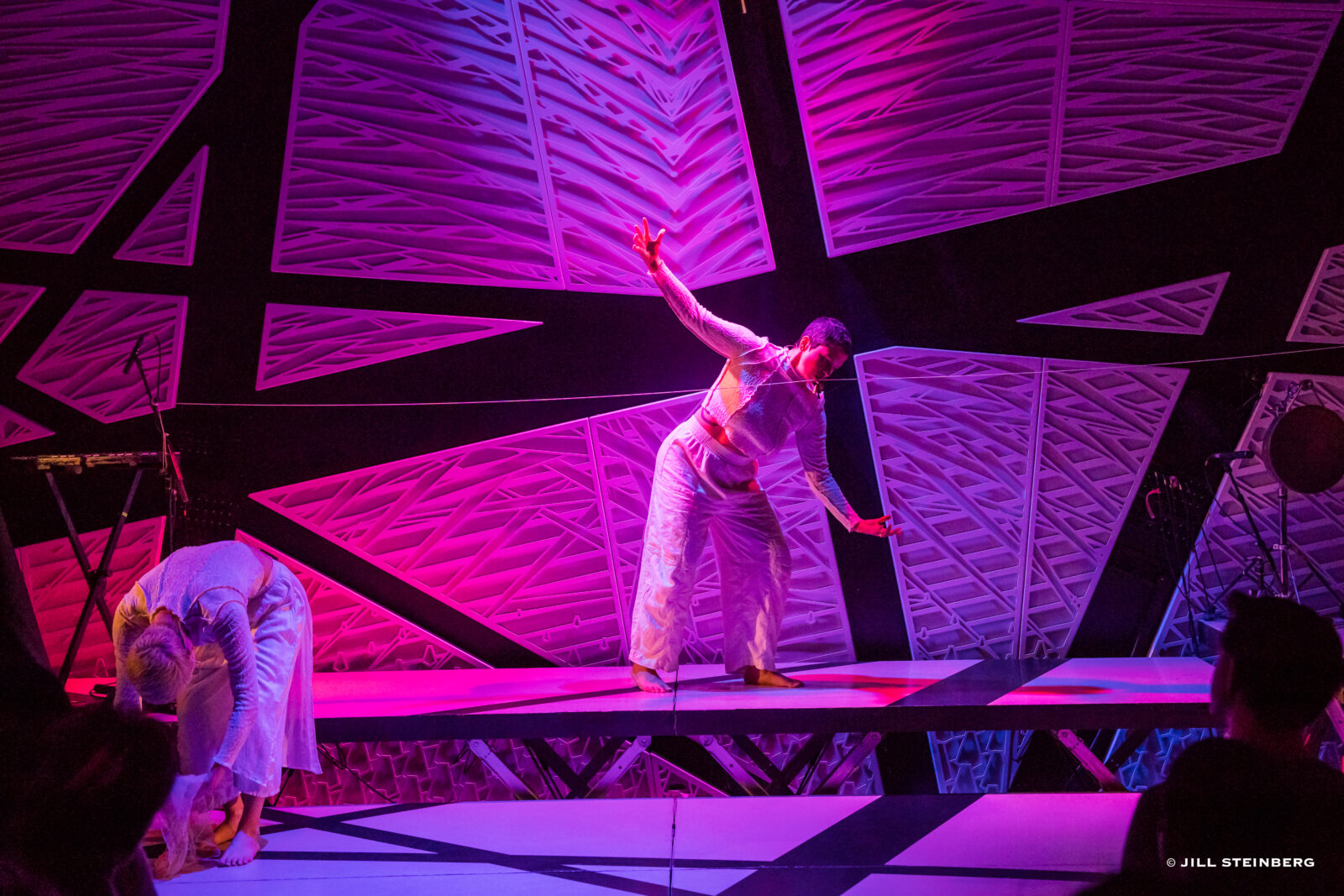
About Holland Andrews + yuniya edi kwon
Brooklyn, New York
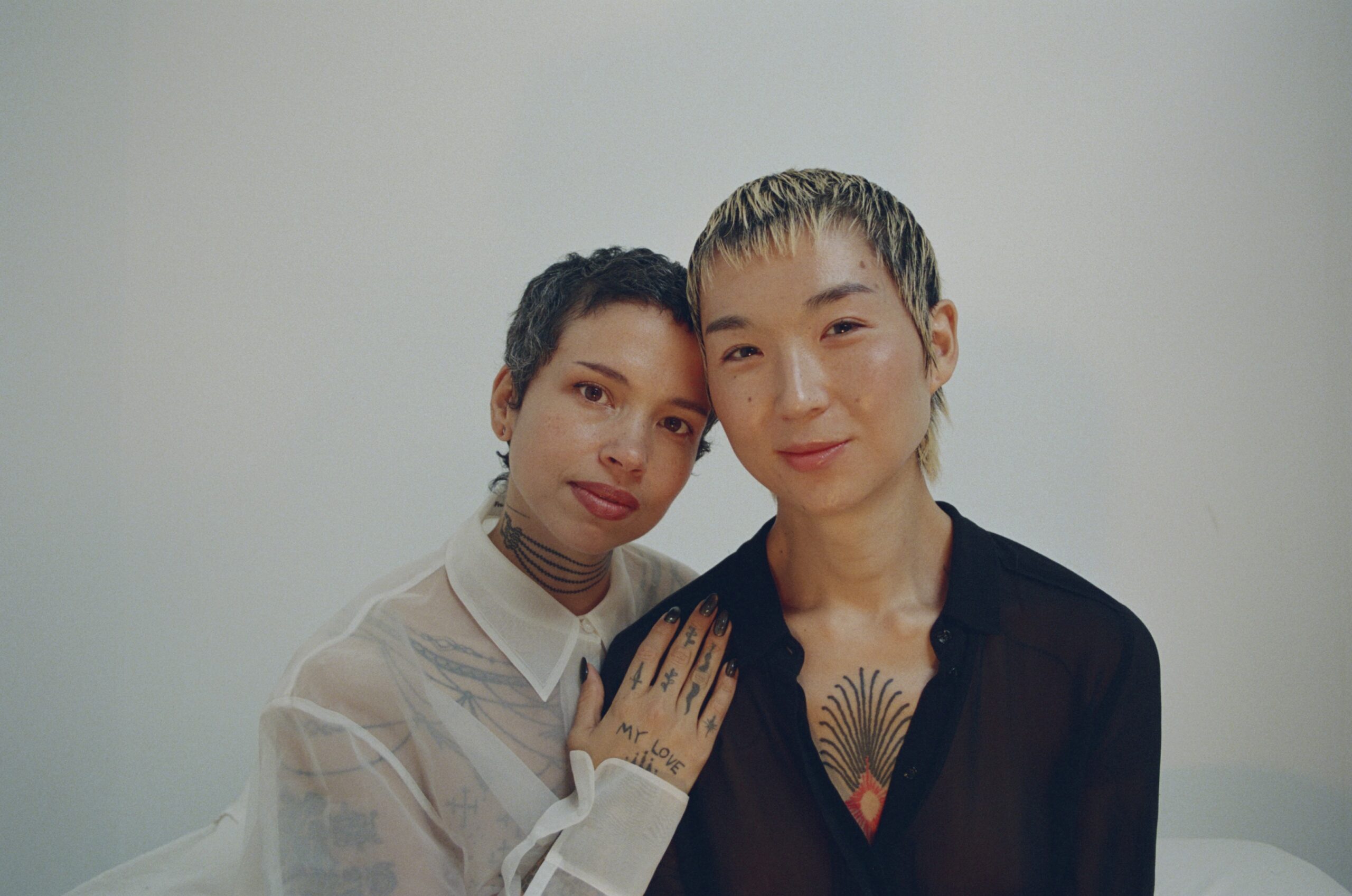 How does it feel to look at nothing is Holland Andrews’ and yuniya edi kwon’s first major, large-scale collaboration. After falling in love while creating an ephemeral, site-specific ritual work in the Catacombs of Brooklyn’s Green-Wood Cemetery, they later married, and have since performed experimental improvisational music as a duo. How does it feel to look at nothing represents the artists creating a radical space of convergence for their life, family, and diverse artistic practices, grounded in the foundational questions that connect and inspire them.
“We view trans family building as a radical act, inseparable from our artistic practice and rooted in a transformational, queer optimism that loves in the face of unprecedented cruelty. And, as performing artists, we recognize that our decision to have a child at this moment in our careers is a formidable risk. How does it feel to look at nothing is our hopeful vessel for this profoundly vulnerable moment. Within it, we allow ourselves to be immersed fully and unapologetically in both performance-making and family building. Within it, we transform a moment of potential vulnerability into one of generative growth, strengthened by a creative community of collaborators, chosen family, friends, and supporters.” —Holland Andrews and yuniya edi kwon
How does it feel to look at nothing is Holland Andrews’ and yuniya edi kwon’s first major, large-scale collaboration. After falling in love while creating an ephemeral, site-specific ritual work in the Catacombs of Brooklyn’s Green-Wood Cemetery, they later married, and have since performed experimental improvisational music as a duo. How does it feel to look at nothing represents the artists creating a radical space of convergence for their life, family, and diverse artistic practices, grounded in the foundational questions that connect and inspire them.
“We view trans family building as a radical act, inseparable from our artistic practice and rooted in a transformational, queer optimism that loves in the face of unprecedented cruelty. And, as performing artists, we recognize that our decision to have a child at this moment in our careers is a formidable risk. How does it feel to look at nothing is our hopeful vessel for this profoundly vulnerable moment. Within it, we allow ourselves to be immersed fully and unapologetically in both performance-making and family building. Within it, we transform a moment of potential vulnerability into one of generative growth, strengthened by a creative community of collaborators, chosen family, friends, and supporters.” —Holland Andrews and yuniya edi kwon
How does it feel to look at nothing is Holland Andrews’ and yuniya edi kwon’s first major, large-scale collaboration. After falling in love while creating an ephemeral, site-specific ritual work in the Catacombs of Brooklyn’s Green-Wood Cemetery, they later married, and have since performed experimental improvisational music as a duo. How does it feel to look at nothing represents the artists creating a radical space of convergence for their life, family, and diverse artistic practices, grounded in the foundational questions that connect and inspire them. “We view trans family building as a radical act, inseparable from our artistic practice and rooted in a transformational, queer optimism that loves in the face of unprecedented cruelty. And, as performing artists, we recognize that our decision to have a child at this moment in our careers is a formidable risk. How does it feel to look at nothing is our hopeful vessel for this profoundly vulnerable moment. Within it, we allow ourselves to be immersed fully and unapologetically in both performance-making and family building. Within it, we transform a moment of potential vulnerability into one of generative growth, strengthened by a creative community of collaborators, chosen family, friends, and supporters.” —Holland Andrews and yuniya edi kwon

About Holland Andrews
Brooklyn, New York
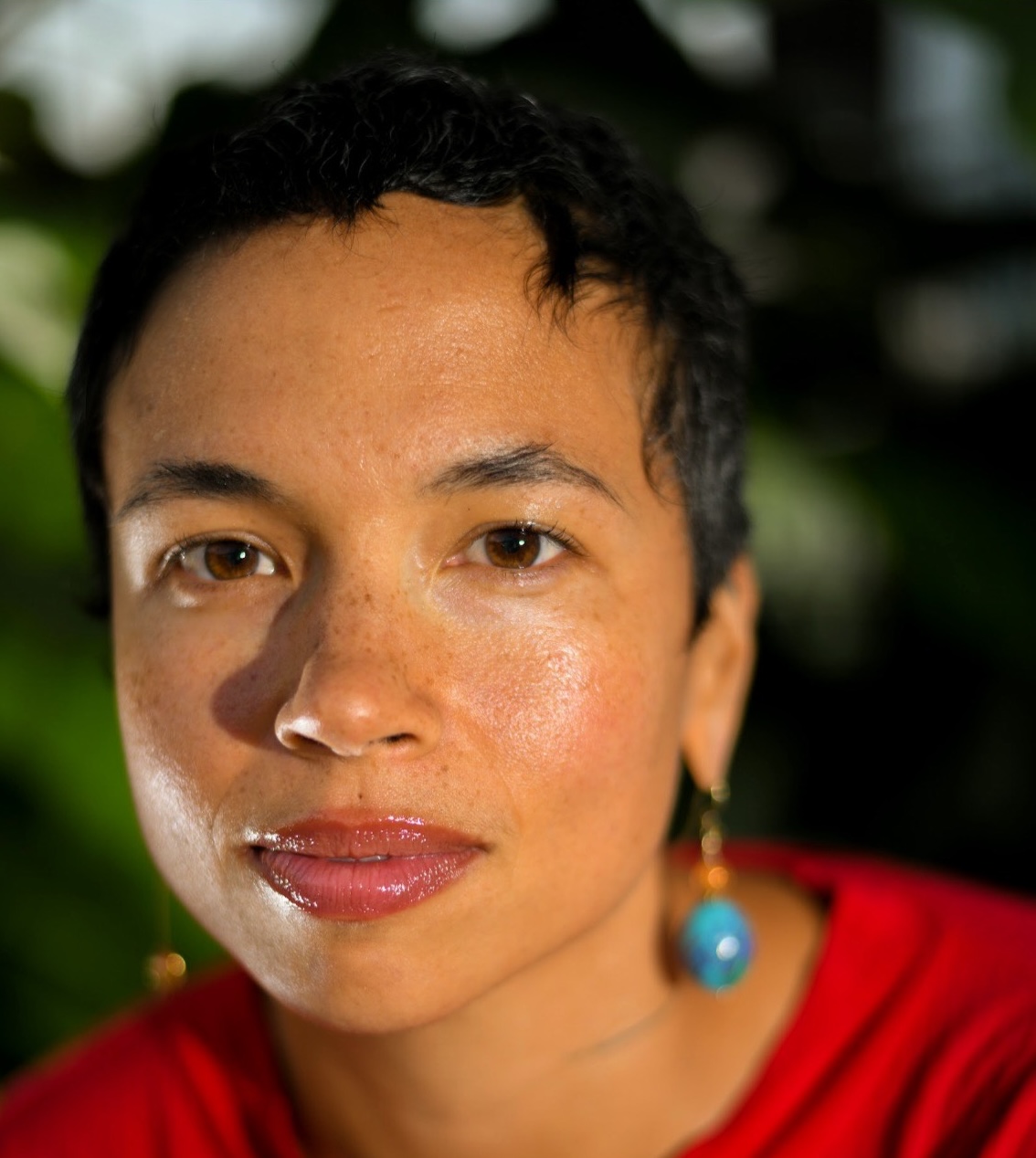 Holland Andrews is a vocalist, clarinetist, composer, improviser, electronic music artist, and performer whose work focuses on the abstraction of operatic and extended-technique voice to build cathartic and dissonant soundscapes. Frequently highlighting themes surrounding vulnerability and healing, Andrews arranges music for voice, clarinet, and electronics, harnessing these instruments’ innate qualities of power and elegance to serve as a cohesive vessel for these themes. As a vocalist, their influences stem from a dynamic range, including contemporary opera, American experimentalism, musical theater, and jazz, while also cultivating their unique vocal style, which integrates these influences with language disintegration, vocal distortion, and Foley.
In addition to creating solo work, Andrews composes music and performs for dance, theater, and film, and their work is toured nationally and internationally with artists such as Bill T. Jones, Will Rawls, Sonya Tayeh, Dorothee Munyaneza, and poet Demian Dinéyazhi. Notable musical collaborations include Son Lux, Christina Vantzou, William Brittelle, West Thordson, Darian Donovan Thomas, and Nils Frahm. In 2024, Andrews was selected to be part of the Whitney Biennial, creating two sound installations and one original performance that featured the audio from the sound installations. They are a Foundation for Contemporary Arts Awardee in Music/Sound (2023) and a United States Artists Fellow (2024).
Holland Andrews is a vocalist, clarinetist, composer, improviser, electronic music artist, and performer whose work focuses on the abstraction of operatic and extended-technique voice to build cathartic and dissonant soundscapes. Frequently highlighting themes surrounding vulnerability and healing, Andrews arranges music for voice, clarinet, and electronics, harnessing these instruments’ innate qualities of power and elegance to serve as a cohesive vessel for these themes. As a vocalist, their influences stem from a dynamic range, including contemporary opera, American experimentalism, musical theater, and jazz, while also cultivating their unique vocal style, which integrates these influences with language disintegration, vocal distortion, and Foley.
In addition to creating solo work, Andrews composes music and performs for dance, theater, and film, and their work is toured nationally and internationally with artists such as Bill T. Jones, Will Rawls, Sonya Tayeh, Dorothee Munyaneza, and poet Demian Dinéyazhi. Notable musical collaborations include Son Lux, Christina Vantzou, William Brittelle, West Thordson, Darian Donovan Thomas, and Nils Frahm. In 2024, Andrews was selected to be part of the Whitney Biennial, creating two sound installations and one original performance that featured the audio from the sound installations. They are a Foundation for Contemporary Arts Awardee in Music/Sound (2023) and a United States Artists Fellow (2024).
Holland Andrews is a vocalist, clarinetist, composer, improviser, electronic music artist, and performer whose work focuses on the abstraction of operatic and extended-technique voice to build cathartic and dissonant soundscapes. Frequently highlighting themes surrounding vulnerability and healing, Andrews arranges music for voice, clarinet, and electronics, harnessing these instruments’ innate qualities of power and elegance to serve as a cohesive vessel for these themes. As a vocalist, their influences stem from a dynamic range, including contemporary opera, American experimentalism, musical theater, and jazz, while also cultivating their unique vocal style, which integrates these influences with language disintegration, vocal distortion, and Foley. In addition to creating solo work, Andrews composes music and performs for dance, theater, and film, and their work is toured nationally and internationally with artists such as Bill T. Jones, Will Rawls, Sonya Tayeh, Dorothee Munyaneza, and poet Demian Dinéyazhi. Notable musical collaborations include Son Lux, Christina Vantzou, William Brittelle, West Thordson, Darian Donovan Thomas, and Nils Frahm. In 2024, Andrews was selected to be part of the Whitney Biennial, creating two sound installations and one original performance that featured the audio from the sound installations. They are a Foundation for Contemporary Arts Awardee in Music/Sound (2023) and a United States Artists Fellow (2024).

About yuniya edi kwon
Brooklyn, New York
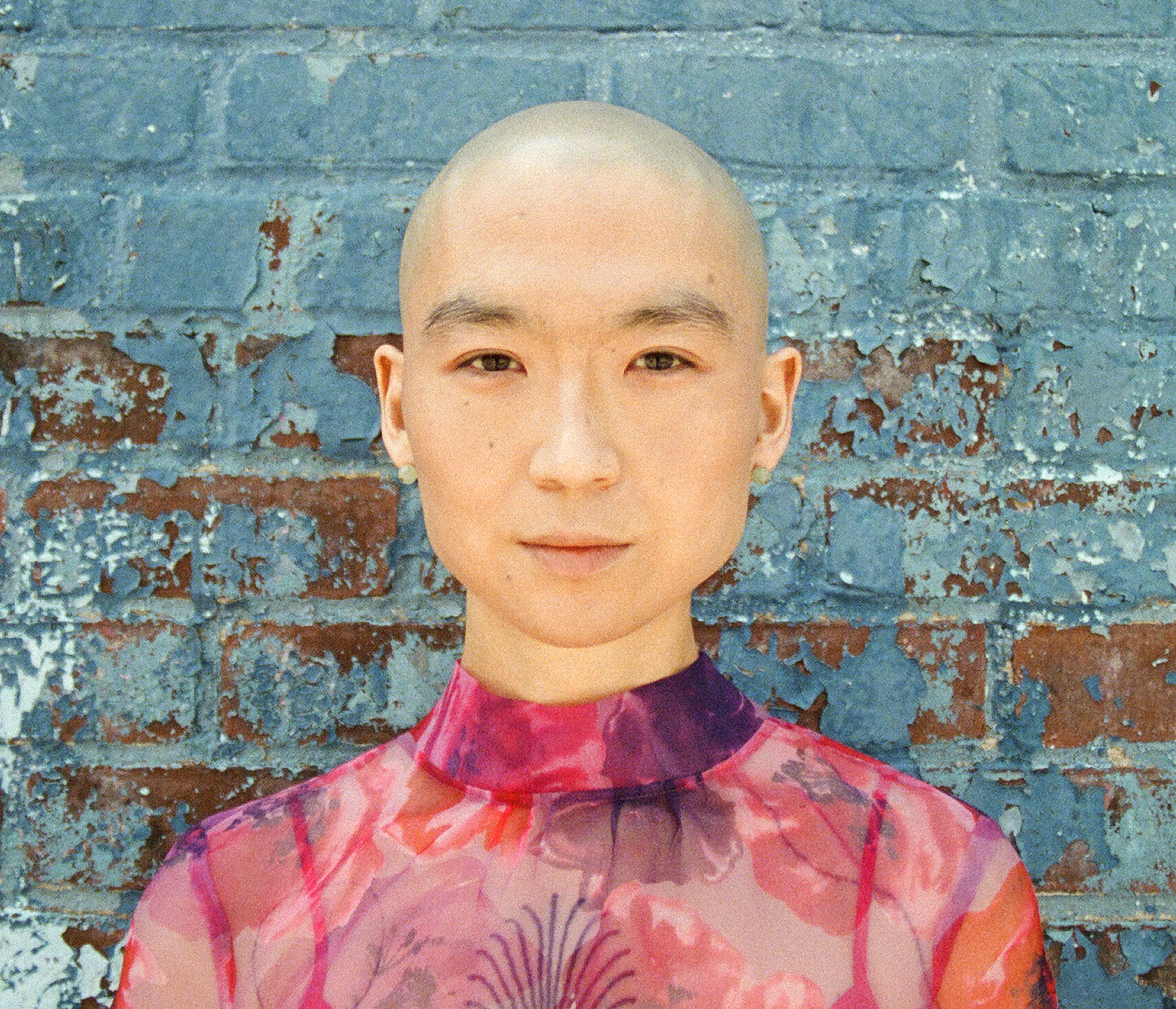 yuniya edi kwon (she/her) is a violinist, vocalist, and interdisciplinary performance maker based in Lenapehoking, or New York City. Her practice connects composition, improvisation, movement, and ceremony to explore transformation & transgression, ritual practice as a tool to queer space & lineage, and the use of mythology to connect, obscure, and reveal. As a composer-performer and improviser, she is inspired by Korean folk timbres & inflections, textures & movement from natural environments, and American experimentalism as shaped by the AACM. Her work as a choreographer and movement artist embodies an expressive release and reclamation of colonialism’s spiritual imprints, connecting to both Japanese Butoh and a lineage of queer trans practitioners of Korean shamanic ritual.
In addition to an evolving, interdisciplinary solo practice, yuniya collaborates with artists of diverse disciplines, including The Art Ensemble of Chicago, Senga Nengudi, Du Yun, Tomeka Reid, Kenneth Tam, Moor Mother, and Degenerate Art Ensemble. She is a Foundation for Contemporary Arts Robert Rauschenberg Awardee, Arts Fellow at Princeton University, Civitella Ranieri Fellow, Johnson Fellow at Americans for the Arts, and United States Artists Ford Fellow.
yuniya edi kwon (she/her) is a violinist, vocalist, and interdisciplinary performance maker based in Lenapehoking, or New York City. Her practice connects composition, improvisation, movement, and ceremony to explore transformation & transgression, ritual practice as a tool to queer space & lineage, and the use of mythology to connect, obscure, and reveal. As a composer-performer and improviser, she is inspired by Korean folk timbres & inflections, textures & movement from natural environments, and American experimentalism as shaped by the AACM. Her work as a choreographer and movement artist embodies an expressive release and reclamation of colonialism’s spiritual imprints, connecting to both Japanese Butoh and a lineage of queer trans practitioners of Korean shamanic ritual.
In addition to an evolving, interdisciplinary solo practice, yuniya collaborates with artists of diverse disciplines, including The Art Ensemble of Chicago, Senga Nengudi, Du Yun, Tomeka Reid, Kenneth Tam, Moor Mother, and Degenerate Art Ensemble. She is a Foundation for Contemporary Arts Robert Rauschenberg Awardee, Arts Fellow at Princeton University, Civitella Ranieri Fellow, Johnson Fellow at Americans for the Arts, and United States Artists Ford Fellow.
yuniya edi kwon (she/her) is a violinist, vocalist, and interdisciplinary performance maker based in Lenapehoking, or New York City. Her practice connects composition, improvisation, movement, and ceremony to explore transformation & transgression, ritual practice as a tool to queer space & lineage, and the use of mythology to connect, obscure, and reveal. As a composer-performer and improviser, she is inspired by Korean folk timbres & inflections, textures & movement from natural environments, and American experimentalism as shaped by the AACM. Her work as a choreographer and movement artist embodies an expressive release and reclamation of colonialism’s spiritual imprints, connecting to both Japanese Butoh and a lineage of queer trans practitioners of Korean shamanic ritual. In addition to an evolving, interdisciplinary solo practice, yuniya collaborates with artists of diverse disciplines, including The Art Ensemble of Chicago, Senga Nengudi, Du Yun, Tomeka Reid, Kenneth Tam, Moor Mother, and Degenerate Art Ensemble. She is a Foundation for Contemporary Arts Robert Rauschenberg Awardee, Arts Fellow at Princeton University, Civitella Ranieri Fellow, Johnson Fellow at Americans for the Arts, and United States Artists Ford Fellow.

